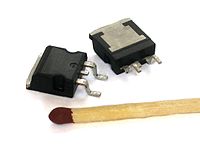
Non‐Volatile Electrolyte‐Gated Transistors Based on Graphdiyne/MoS2 with Robust Stability for Low‐Power Neuromorphic Computing and Logic‐In‐Memory
Sign Up to like & getrecommendations! Published in 2021 at "Advanced Functional Materials"
DOI: 10.1002/adfm.202100069
Abstract: Artificial synapses are the key building blocks for low‐power neuromorphic computing that can go beyond the constraints of von Neumann architecture. In comparison with two‐terminal memristors and three‐terminal transistors with filament‐formation and charge‐trapping mechanisms, emerging… read more here.
Keywords: low power; neuromorphic computing; mos2; electrolyte gated ... See more keywords

Emerging Memristive Artificial Synapses and Neurons for Energy-Efficient Neuromorphic Computing.
Sign Up to like & getrecommendations! Published in 2020 at "Advanced materials"
DOI: 10.1002/adma.202004659
Abstract: Memristors have recently attracted significant interest due to their applicability as promising building blocks of neuromorphic computing and electronic systems. The dynamic reconfiguration of memristors, which is based on the history of applied electrical stimuli,… read more here.
Keywords: energy efficient; artificial synapses; efficient neuromorphic; synapses neurons ... See more keywords

Harnessing the Metal-Insulator Transition of VO2 in Neuromorphic Computing.
Sign Up to like & getrecommendations! Published in 2022 at "Advanced materials"
DOI: 10.1002/adma.202205294
Abstract: Future-generation neuromorphic computing seeks to overcome the limitations of von Neumann architectures by co-locating logic and memory functions, thereby emulating the function of neurons and synapses in the human brain. Despite remarkable demonstrations of high-fidelity… read more here.
Keywords: insulator transition; neuromorphic computing; metal insulator; design ... See more keywords

Flexible Solution Processable Black Phosphorus Based Optoelectronic Memristive Synapse for Neuromorphic Computing and Artificial Visual Perception Applications.
Sign Up to like & getrecommendations! Published in 2023 at "Advanced materials"
DOI: 10.1002/adma.202300446
Abstract: Being renowned for operating with visible light pulses and electrical signals, optoelectronic memristive synaptic devices have excellent potential for neuromorphic computing systems and artificial visual information processing. Here, we present a flexible back-end-of-line compatible optoelectronic memristor… read more here.
Keywords: visual perception; synaptic features; neuromorphic computing; artificial visual ... See more keywords

Flexible Artificial Optoelectronic Synapse based on Lead‐Free Metal Halide Nanocrystals for Neuromorphic Computing and Color Recognition
Sign Up to like & getrecommendations! Published in 2022 at "Advanced Science"
DOI: 10.1002/advs.202202123
Abstract: Optoelectronic synapses combining optical‐sensing and synaptic functions are playing an increasingly vital role in the neuromorphic computing systems development, which can efficiently process visual information and complex recognition, memory, and learning. Metal halides are considered… read more here.
Keywords: recognition; lead free; neuromorphic computing; metal halide ... See more keywords

Ligand‐Triggered Self‐Assembly of Flexible Carbon Dot Nanoribbons for Optoelectronic Memristor Devices and Neuromorphic Computing
Sign Up to like & getrecommendations! Published in 2023 at "Advanced Science"
DOI: 10.1002/advs.202207688
Abstract: Carbon dots (CDs) are widely utilized in sensing, energy storage, and catalysis due to their excellent optical, electrical and semiconducting properties. However, attempts to optimize their optoelectronic performance through high‐order manipulation have met with little… read more here.
Keywords: carbon; neuromorphic computing; ligand triggered; cds ribbons ... See more keywords

Memristive Memory Enhancement by Device Miniaturization for Neuromorphic Computing
Sign Up to like & getrecommendations! Published in 2023 at "Advanced Electronic Materials"
DOI: 10.1002/aelm.202201111
Abstract: The areal footprint of memristors is a key consideration in material‐based neuromorphic computing and large‐scale architecture integration. Electronic transport in the most widely investigated memristive devices is mediated by filaments, posing a challenge to their… read more here.
Keywords: neuromorphic computing; memory enhancement; enhancement device; memristive memory ... See more keywords

Domain wall dynamics in (Co/Ni)n nanowire with anisotropy energy gradient for neuromorphic computing applications
Sign Up to like & getrecommendations! Published in 2021 at "Journal of Magnetism and Magnetic Materials"
DOI: 10.1016/j.jmmm.2021.168131
Abstract: Abstract Artificial Intelligence (AI) has been gaining traction recently. However, they are executed on devices with the von Neumann architecture, requiring high power input. Consequently, brain-inspired neuromorphic computing has been gaining attention because it is… read more here.
Keywords: domain wall; wall dynamics; neuromorphic computing; dynamics nanowire ... See more keywords

Linearity improvement of HfOx-based memristor with multilayer structure
Sign Up to like & getrecommendations! Published in 2021 at "Materials Science in Semiconductor Processing"
DOI: 10.1016/j.mssp.2021.106131
Abstract: Abstract The limitation of traditional Von Neumann architecture could be resolved by machine learning training in neuromorphic computing. However, the nonlinearity characteristic during conductance modulation in memristor severely restricts its application in neuromorphic computing. To… read more here.
Keywords: neuromorphic computing; memristor; multilayer structure; linearity ... See more keywords

Flexible transparent InZnO synapse transistor based on Li1.3Al0.3Ti0.7(PO4)3/polyvinyl pyrrolidone nanocomposites electrolyte film for neuromorphic computing
Sign Up to like & getrecommendations! Published in 2020 at "Materials Today Physics"
DOI: 10.1016/j.mtphys.2020.100264
Abstract: Abstract The hardware implementation of neuromorphic computing has attracted growing interest as a promising candidate for confronting the bottleneck of traditional von Neumann computers. Moreover, flexible artificial synapses with learning capabilities are easier to achieve… read more here.
Keywords: inzno synapse; flexible transparent; synapse transistor; transparent inzno ... See more keywords

Excitation-independent and fluorescence-reversible N-GQD for picomolar detection of inhibitory neurotransmitter in milk samples ‒ an alleyway for possible neuromorphic computing application.
Sign Up to like & getrecommendations! Published in 2021 at "Talanta"
DOI: 10.1016/j.talanta.2021.123132
Abstract: N‒GQDs with an average size of ca. 20-30 nm are utilized for the picomolar detection of inhibitory neurotransmitters, glycine (Gly), in pH ca. 7.0. The crystalline nature, morphology, elemental composition, and chemical state of N-GQDs are… read more here.
Keywords: excitation independent; neuromorphic computing; milk samples; detection inhibitory ... See more keywords